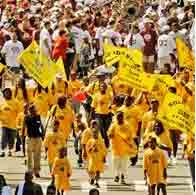Over the years, unions have energized supporters with songs like "We Shall Not Be Moved," "Bread and Roses" and "De Colores."
VOICE ONE:
Welcome to THIS IS AMERICA in VOA Special English. I'm Steve Ember.
VOICE TWO:

And I'm Barbara Klein. Most of the world observes Labor Day on May 1st. But the United States has its workers holiday on the first Monday in September. Today on our program, we have a few songs from the history of the American labor movement.
(MUSIC)
VOICE ONE:
Labor songs are traditionally stories of struggle and pride, of timeless demands for respect and the hope for a better life.
Sometimes they represent old songs with new words. One example is "We Shall Not Be Moved." It uses the music and many of the same words of an old religious song.
Here is folksinger Pete Seeger with "We Shall Not Be Moved."
(MUSIC)
VOICE TWO:
Many classic American labor songs came from workers in the coal mines of the South. Mine owners bitterly opposed unions. In some cases, there was open war between labor activists and coal mine operators.
VOICE ONE:
Once, in Harlan County, Kentucky, company police searched for union leaders. They went to one man's home but could not find him there. So they waited outside for several days.

The coal miner's wife, Florence Reece, remained inside with her children. She wrote this song, "Which Side Are You On?"
Again, here is Pete Seeger.
(MUSIC)
VOICE TWO:
Probably the most famous labor songwriter in America was Joe Hill. He was born in Sweden and came to the United States in the early 1900s. He worked as an unskilled laborer.
Joe Hill joined the Industrial Workers of the World, known as the Wobblies. More than any other union, they used music in their campaigns, urging members to "sing and fight."
VOICE ONE:
One of Joe Hill's best-known songs is "Casey Jones." It uses the music from a song about a train engineer. In the old song, Casey Jones is a hero. He bravely keeps his train running in very difficult conditions.
In Joe Hill's version, Casey Jones is no hero. His train is unsafe. Yet he stays on the job after other workers have called a strike against the railroad company.
Pete Seeger and the Song Swappers sing "Casey Jones (The Union Scab)."
(MUSIC)
VOICE TWO:
Another American labor song is called "Bread and Roses." That term was connected with the women's labor movement.
The song was based on a poem called "Bread and Roses" by James Oppenheim. The poem was published in The American Magazine in December of 1911.
The following month there was a famous strike by textile workers in Lawrence, Massachusetts. They won higher pay and better working conditions. Oppenheim's poem gained more attention.
At that time, conditions in factories were already a national issue. In 1911, a fire at a clothing factory in New York had taken the lives of 146 people. The victims were mostly immigrant women.
Here is Pat Humphries with "Bread and Roses."
(MUSIC)
VOICE ONE:
Union activists know that labor songs can unite and help people feel strong. This can be true even when the music has nothing to do with unions.
"De Colores" is a popular Spanish folksong. It talks about fields in the spring, little birds, rainbows and the great loves of many colors.
This song is popular with supporters of the United Farm Workers union. We listen as Baldemar Velasquez leads the band Aguila Negra in "De Colores."
(MUSIC)
VOICE TWO:
For many years, folksinger Joe Glazer was a union activist with a guitar. He was also a labor historian. "Labor's Troubadour" was the name of a book he wrote about his life. He believed in organized labor and preserving the musical history of the American labor movement. Joe Glazer died in 2006 at the age of 88.
Here is Joe Glazer with "Solidarity Forever," written by Ralph Chaplin.
(MUSIC)
VOICE ONE:
Our program was written by Jerilyn Watson and produced by Mario Ritter. I'm Steve Ember.
VOICE TWO:
And I'm Barbara Klein. To learn more about American life, go to voaspecialenglish.com, where you can download archives of our programs. Join us again next week for THIS IS AMERICA in VOA Special English.
swapper: person who trade one thing for another 以物易物者
scab: a strikebreaker 破坏罢工者
troubadour: a singer of folk songs 吟游诗人
Related stories:
Authorities seek greater enforcement of child labor laws
Let laborers share the fruits of economic growth
May Day Golden Week may fade away
Mediation law drafted as labor disputes increase
(Source: VOA 英语点津编辑)